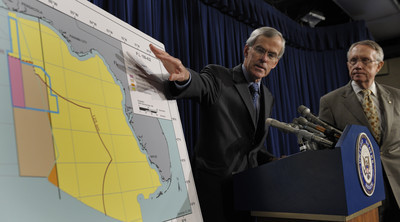Speculating, drilling leases debated
WASHINGTON -- As gasoline prices continued to rise last week, both the House and Senate talked about solutions but didn't deliver any relief because of partisan bickering.
The House voted 244-173 to pass a "use it or lose it" bill that would strip oil companies of leases they own on federal land where oil drilling is allowed but is not being done.
A simple majority was not sufficient to pass the Democratic plan, however.
Since Democratic leaders brought the bill to the floor under an expedited procedure to block Republicans from offering their own proposal for offshore drilling, House rules required a two-thirds majority for passage.
Democrats said 68 million leased acres are not producing oil, and drilling on those acres could help lower gasoline prices.
Republicans and the Bush administration, which issued a veto threat, argued the bill would discourage companies from seeking new leases for exploration. GOP leaders said the Democratic measure would create a fear that leases would be lost if oil and gas are not produced rapidly enough.
Reps. Shelley Berkley, D-Nev.; and Jon Porter, R-Nev., voted for the "use it or lose it" plan.
Rep. Dean Heller, R-Nev., voted against it.
Meanwhile, the Senate bogged down in debate over competing strategies to address the oil crisis.
Democrats introduced a bill to crack down on commodity speculators they claim are driving up oil prices.
Republicans offered their own bill targeting speculators but also advocating offshore drilling.
MEDICARE VETO OVERRIDDEN
On the same day President Bush vetoed a Medicare bill, the House and Senate voted overwhelmingly to override the veto, making the bill a law.
The bill canceled a 10.6 percent pay cut for doctors who treat Medicare patients. Medicare formulas periodically impose the cuts, which are usually negated by lawmakers.
This year, Congress restored doctors' payments by reducing funds for Medicare Advantage, a Bush-favored program that lets patients receive benefits through their own private health insurance plans.
As a result, private insurers will pay $14 billion over the next five years to prevent cuts in payments to doctors.
After the House voted 383-41 to override the veto, the Senate voted 70-26 to make the override official.
Berkley, Heller and Porter voted to override.
Sen. Harry Reid, D-Nev., voted to override.
Sen. John Ensign, R-Nev., voted to sustain Bush's veto.
GLOBAL AIDS PROGRAM PASSES
The Senate voted 80-16 to spend $48 billion overseas during the next five years to battle AIDS and other diseases.
Among other things, the measure would repeal a 1987 ban on HIV-positive visitors to the United States. Only 11 other countries still have such a ban.
The House passed a similar bill in April and signaled it would accept the Senate version.
Bush, a strong supporter of the original global AIDS legislation in 2003, is expected to sign the Senate bill into law.
Bush praised the Senate vote, saying it ensures America will continue to play a leading role in fighting diseases around the world.
Reid voted for the global AIDS program.
Ensign voted against it.

















